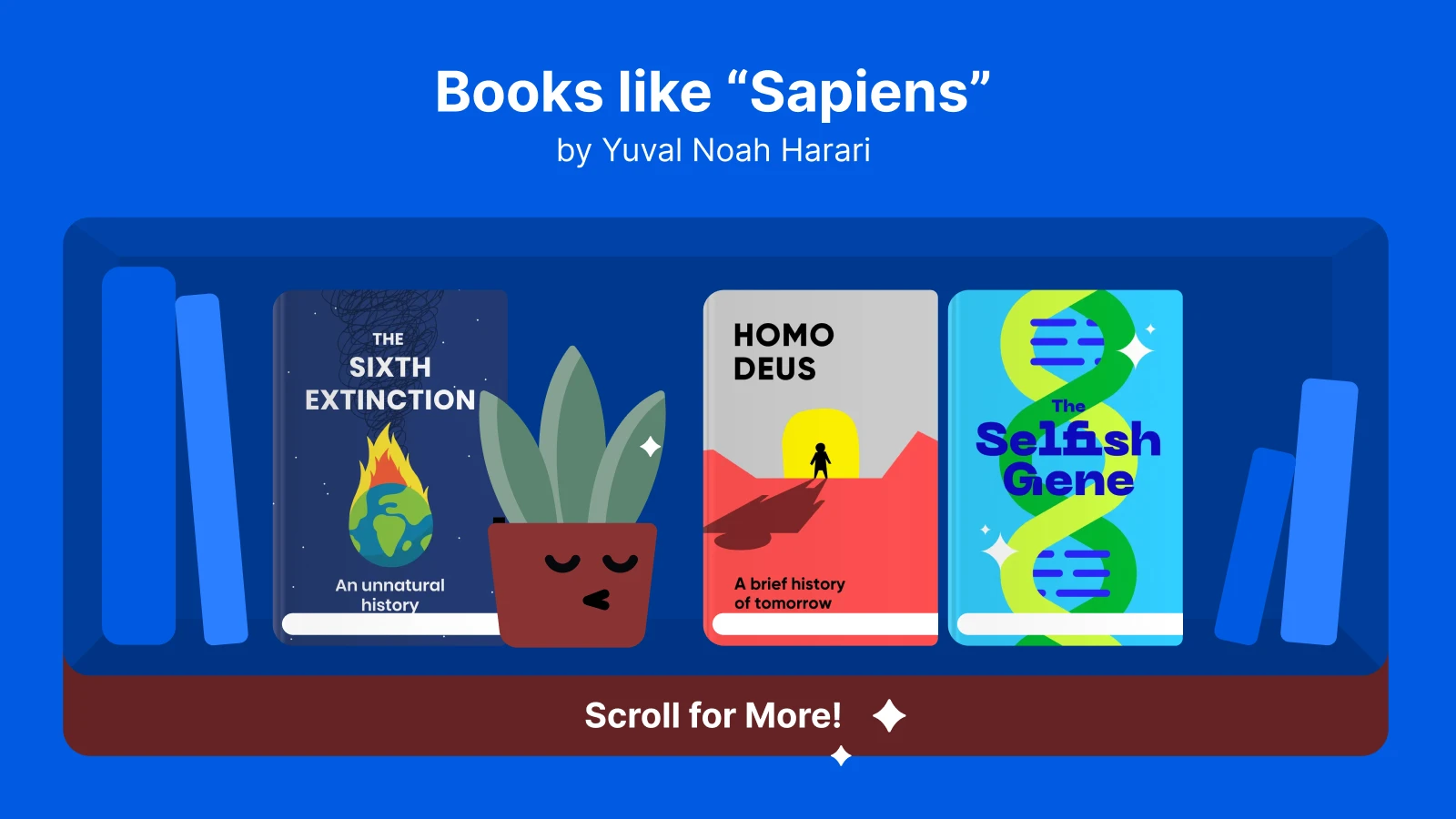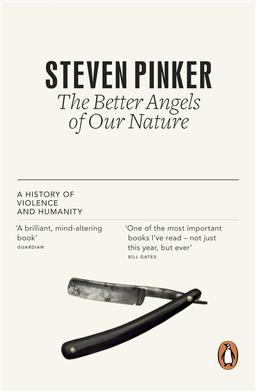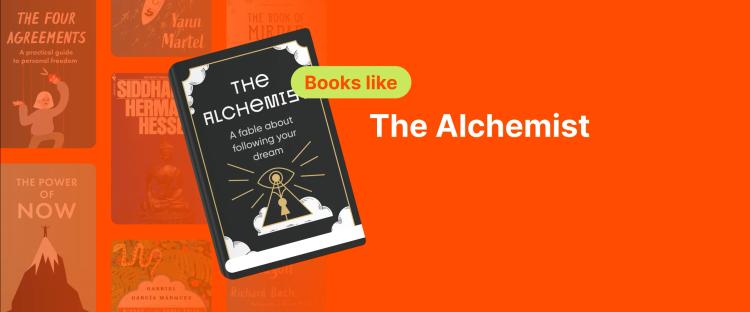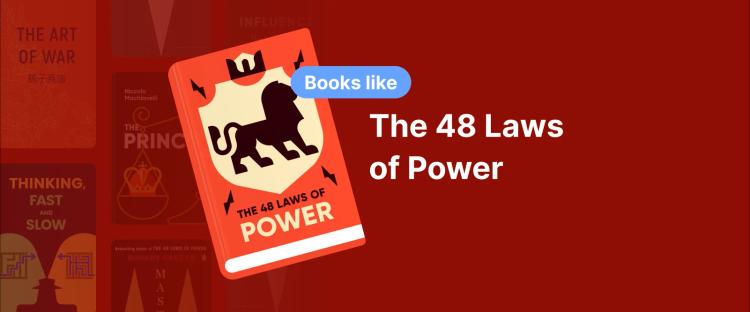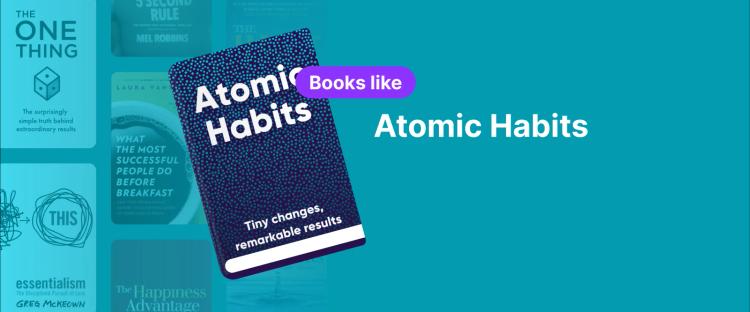If 'Sapiens' opened your eyes to the big picture of human history, you're probably craving more. We get it. Yuval Noah Harari showed us how Homo sapiens went from hunting mammoths to scrolling smartphones. But that's just one story.
This list includes 17 books like 'Sapiens' that dig even deeper. You'll explore the history of human civilization from new angles — genetics, geography, technology, and the forces that shaped everything we know. Each book offers a fresh lens on humanity's journey and where we might be headed.
Want to absorb these ideas faster?
Download Headway and get 15-minute summaries of the world's best nonfiction books. Learn on your commute, during lunch, or right before bed — big ideas in less time.
Quick question: What are the five best books like 'Sapiens' to read in 2025?
'Homo Deus' by Yuval Noah Harari: The natural next step. If 'Sapiens' looked at our past, this bestseller looks at our 21st century with AI, biotech, and what comes after humanity.
'Guns, Germs, and Steel' by Jared Diamond: Why did the agricultural revolution occur earlier in some societies than in others? Diamond shows how geography, not genetics, shaped human history.
'The Sixth Extinction' by Elizabeth Kolbert: A sobering look at how humans are causing a mass extinction event right now, and what that means for our future.
'A Short History of Nearly Everything' by Bill Bryson: From the Big Bang to human civilization, Bryson makes complex science fun and accessible for everyone.
'The Gene' by Siddhartha Mukherjee: The story of genetics, from Mendel's pea plants to CRISPR technology. A deep dive into what makes us who we are.
Top similar books to read if you like 'Sapiens' by Yuval Noah Harari
These 17 books each bring something unique to the table. Some zoom in on specific parts of our history, like the Stone Age. Others look at what's coming next in the modern world. But each of them will make you think — that's a promise from the Headway team.
📘 Curious but short on time? Get Headway to explore all 17 in under 5 hours total!
1. 'The Sixth Extinction: An Unnatural History' by Elizabeth Kolbert
This pick proves we are living through a tragedy. A mass extinction event is underway, and Homo sapiens is the cause. Pulitzer Prize winner Kolbert shows that our destructive impact began far before the Industrial Age. Just as 'Sapiens' examines how we wiped out Neanderthals and megafauna, this book digs into our massive environmental footprint throughout human history. Read this if you dare to face the consequences of our current moment.
Similarities between the books:
Both explore how Homo sapiens have changed the planet.
Each book takes a great view of our activity and its consequences.
Both will make you think about our responsibility for Earth's future.
2. 'Homo Deus: A Brief History of Tomorrow' by Yuval Noah Harari
This text is the essential follow-up to 'Sapiens.' Because if 'Sapiens' was the story of our past, 'Homo Deus' is about our future. Harari explores how technology might change the very definition of a human being. What happens when AI is smarter than us? Can we truly conquer death and become god-like? This book builds on every big idea from 'Sapiens' to imagine where humanity might be headed in the 21st century. Read this to get a frightening preview of the world your children will live in.
Similarities between the books:
Both track the evolution of Homo sapiens — one through the past, one into the future.
Each book challenges you to think about the ethics and dangers of human progress.
Both examine how technology shapes our human societies and human life.
3. 'The Selfish Gene' by Richard Dawkins
Richard Dawkins' 'The Selfish Gene' completely flipped how we see biology. He argues that genes — not us — are the main players in evolution. We are just the vehicles they use to survive and spread. This book is a scientific deep dive into the 'why' behind our behavior. While 'Sapiens' gives you the big picture of human history, 'The Selfish Gene' zooms in on the unseen forces at the genetic level. Read this to learn the real reason you exist (hint: it's not you).
Similarities between the books:
Both explore human evolution from different angles — Dawkins focuses on genes, while Harari focuses on historical forces.
Each book examines what truly drives human behavior and how societies develop.
Both make you radically rethink what you thought you knew about human nature.
4. 'A Short History of Nearly Everything' by Bill Bryson
Here, you will find everything from the birth of the universe to the rise of human civilization, and the author makes it really funny and clear. Bryson has a gift for making complex science easy to grasp. Like Harari, he takes massive topics and breaks them down so anyone can follow the thrilling story. Read this to realize how incredible it is that you are here at all.
Similarities between the books:
Both give you a broad view of human history and how we understand the world.
Each combines science and history to tell one compelling big picture story.
Both are written so clearly that anyone can enjoy them, whether you're a science fan or just curious.
5. 'The Gene: An Intimate History' by Siddhartha Mukherjee
With this pick, you will start with Mendel's pea plants and finish on the CRISPR gene-editing technology. The author mixes hard science with personal stories to show us how genes shape every aspect of life. Read this to understand the code that defines both your identity and future.
Similarities between the books:
Both explore human evolution. 'The Gene' focuses on genetics, 'Sapiens' on broader history.
Each book wrestles with serious ethical questions raised by scientific progress.
Both show how science and technology have transformed and complicated human societies.
📘 Fascinated by human evolution? Get Headway for breakthrough science insights you'll actually understand!
6. 'Guns, Germs, and Steel' by Jared Diamond
In 'Guns, Germs, and Steel,' Jared Diamond asks why European human societies dominate others. His answer is revolutionary. It's not culture or intelligence. It's geography. Diamond shows how the plants, animals, and continental layout available to different societies shaped their development. Like 'Sapiens,' this book shows that massive, impersonal forces — not just individual leaders — drive human history. Read this to finally understand the true, hidden reasons behind global power.
Similarities between the books:
Both use multiple fields — anthropology, history, biology — to explain human history.
Each book emphasizes how factors beyond human control shaped our human societies.
Both look at how the agricultural revolution changed everything for human civilization.
7. 'The Invention of Nature' by Andrea Wulf
Andrea Wulf's 'The Invention of Nature' tells the lost story of Alexander von Humboldt. This German naturalist completely changed how we see nature and our place in it. Humboldt was a heroic explorer, climbing volcanoes and discovering what we now call ecology — the idea that all things in nature are connected. His ideas deeply influenced Darwin and Thoreau. Read this to meet the forgotten hero who shaped our reality.
Similarities between the books:
Both make complex topics accessible.
Both explore the human-nature relationship.
Each book shows how crucial thinkers influenced our understanding of the world.
8. 'The Silk Roads' by Peter Frankopan
Well, traditional history focuses on Europe, but Frankopan looks at the trade routes connecting East and West. These Silk Roads were the true center of the world, shaping civilizations, spreading religions, and fueling wars. Like 'Sapiens,' this book gives you a vital big picture of our shared past and the roots of the modern world. Read this to shift your historical center of gravity.
Similarities between the books:
Both weave together history, anthropology, and economics.
Each challenges standard views by offering a non-Eurocentric perspective.
Both make history feel relevant to today.
9. 'Metropolis: A History of the City, Humankind's Greatest Invention' by Ben Wilson
Ben Wilson's 'Metropolis' traces the rise of cities throughout human history. Wilson shows that urban centers are what truly drive cultural, political, and economic change. This story is about how Homo sapiens organized itself into complexity. It fits perfectly with Harari's exploration of how complex human societies began. Read this to see how walls and streets created the world we live in.
Similarities between the books:
Both explore how our civilization became complex over time.
Each emphasizes how the environment shaped progress.
Both explain how every new generation influences change.
📘 Love big-picture history? Download Headway for civilization-changing ideas from top historians!
10. 'Entangled Life' by Merlin Sheldrake
Choose this title if you want to explore the strange world of fungi. These organisms are everywhere, and they're more important than you can imagine. Fungi connect ecosystems and support human life in ways we are just starting to realize. This book is a radical reminder that Homo sapiens are not the only, or even the most important, life form on Earth. Read this to learn about the biological reality that links all life.
Similarities between the books:
Both explore how different life forms are fundamentally connected on Earth.
Each shows how small or hidden factors can have huge impacts on the environment and human society.
Both make you rethink your understanding of nature and our place in it.
11. 'The Anarchy' by William Dalrymple
William Dalrymple's book tells the shocking story of the world's first global corporate superpower — the East India Company. It reshaped India and the world through brutal economic and political force. This book shows how power, conquest, and globalization truly work — themes that echo throughout 'Sapiens.' It offers a vital perspective that is often missing from Western-focused history books. Read this to see how a single company brought down an empire and changed global trade forever.
Similarities between the books:
Both examine how authorities shape modern societies.
Each discusses the consequences of colonialism and imperialism that we face today.
Both make you reevaluate historical events and how they affect us in 2025.
12. 'Wind, Sand and Stars' by Antoine de Saint-Exupéry
'Wind, Sand and Stars' is a memoir by the French pilot Antoine de Saint-Exupéry. It reflects on his life as an early aviator. He grapples with the meaning of the human spirit, the beauty of nature, and our deep connections with one another. Saint-Exupéry asks the biggest questions about humanity and our place in the universe — the same kind of existential reflection that 'Sapiens' provokes. Read this to connect your internal life with the grand scale of history.
Similarities between the books:
Both explore what it means to be human.
Each uses reflection to make complex themes accessible.
Both highlight the fragility and wonder of human life.
13. 'The Better Angels of Our Nature: Why Violence Has Declined' by Steven Pinker
We are becoming less violent. Steven Pinker backs this up with data showing how violence has decreased throughout human history. Pinker explores factors like the rise of the State, the Enlightenment, and communication. Like 'Sapiens,' this book takes a comprehensive, evidence-based look at the arc of human evolution and moral progress. Read this for a powerful reason to feel optimistic about humanity's future.
Similarities between the books:
Both analyze human history and look at how human societies have evolved.
Each explores ethical and moral progress across centuries.
Both challenge you to think about the forces that have shaped our development.
📘 Want evidence-based optimism? Start Headway for data-driven insights that restore hope!
14. 'Collapse: How Societies Choose to Fail or Succeed' by Jared Diamond
Jared Diamond's 'Collapse' is a critical warning. It examines why past civilizations — from Easter Island to the Maya — fell apart. His analysis is brutally clear: environmental factors and poor choices played a massive role. Diamond uses these historical lessons to show what modern societies must do to avoid the same fate. This theme runs powerfully through 'Sapiens' as well. Read this to learn the ancient lessons that could save our own civilization.
Similarities between the books:
Both analyze how the environment affects human societies.
Each uses case studies to illustrate global themes.
Both stress the importance of learning from history to tackle new challenges.
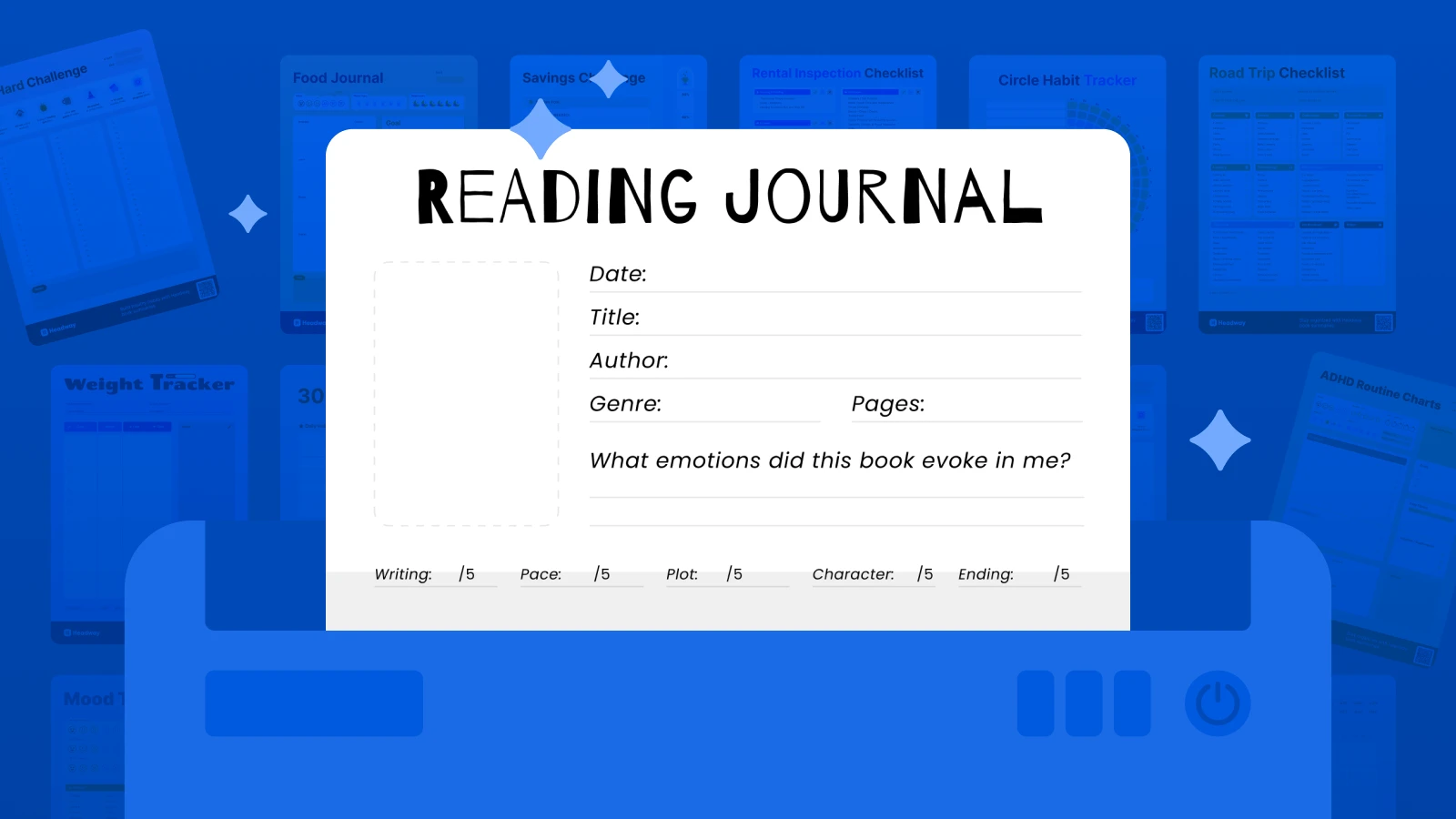
15. 'The Righteous Mind: Why Good People Are Divided by Politics and Religion' by Jonathan Haidt
Jonathan Haidt raises a great question: Why do we disagree so much about morality and politics? Haidt uses evolutionary psychology to show how our brains are wired. Our reasoning, he argues, is often driven by ingrained intuition, not pure logic. Like 'Sapiens,' this book examines the cognitive and emotional forces that underpin human societies and behavior. Read this to truly understand why people with different beliefs can't seem to talk to one another.
Similarities between the books:
Both explore the psychological forces behind human behavior.
Each looks at why human societies have conflicts.
Both help us understand human nature and the challenges we face every day.
16. 'Civilization: The West and the Rest' by Niall Ferguson
Ferguson identifies six key elements that gave the West its edge. This title provides a sweeping view of human history and questions conventional narratives about progress. It asks what's next for the modern world. Read this to understand the origins of global power in the last 500 years.
Similarities between the books:
Both give an overview of global interconnectedness.
Each challenges historical narratives by examining the underlying success.
They blend insights from anthropology and economics.
17. 'A Brief History of Time' by Stephen Hawking
This New York Times bestseller tackles the most monumental questions about the universe. Here you will find topics like the Big Bang, black holes, and the nature of space. Like 'Sapiens,' it takes a vast, historical view. But instead of charting humanity's course from the Stone Age, it charts the cosmos's. Read this to grasp the mind-bending reality of the universe we inhabit.
Similarities between the books:
Both tackle monumental, all-encompassing subjects (human history vs. cosmic history).
Each book is a seminal work of popular science, written to make highly complex ideas accessible.
Both push the reader to consider their place in the universe and the biggest questions of existence.
📘 Mind officially blown? Try Headway for universe-expanding ideas from scientific geniuses!
Accelerate your own evolution with Headway
Love these ideas, but don't have time to read 17 books? The Headway app has your back. It turns complex books into 15-minute summaries so you can learn on the go.
Headway offers audio summaries, personalized reading lists, and progress tracking. Whether you want to explore human evolution, dive into genetics, or understand how cities shaped civilization, you'll find what you need.
With Headway, you get key insights from books like 'Sapiens: A Brief History of Humankind' without spending weeks reading them. Download Headway today and keep expanding your knowledge — one summary at a time.
Frequently asked questions about books like 'Sapiens'
What's 'Sapiens' about?
'Sapiens: A Brief History of Humankind' by Yuval Noah Harari explores how Homo sapiens evolved from ordinary animals into the planet's dominant species. Blending history and science, it examines what sets us apart. Read this book if you want to know how our beliefs continue to shape humanity's future.
Should I read 'Sapiens' before 'Homo Deus'?
Yes — ideally. 'Sapiens' explores how Homo sapiens outlasted the Neanderthals and rose to dominate the planet. 'Homo Deus' then looks ahead, imagining how we might evolve beyond biology itself. Reading them in order helps you grasp the whole arc — from our origins to our possible future.
What books are similar to 'Sapiens'?
If you loved tracing humanity's journey from Neanderthals to modern civilization, try 'The Dawn of Everything' by David Graeber and David Wengrow or Jared Diamond's 'Guns, Germs, and Steel.' Both reimagine how societies evolved, combining history, science, and anthropology to show how humans became who we are.
What book category is 'Sapiens'?
It's an interdisciplinary blend of popular science, history, anthropology, and philosophy. Harari bridges evolutionary biology with cultural history — from the extinction of the Neanderthals to the birth of religion, trade, and technology — making it a genre-defying exploration of what it means to be human.
What's the most influential book in human history?
That depends on how you define influence. Many point to the Bible or Qur'an for shaping civilizations, while others cite scientific works like Darwin's 'On the Origin of Species,' which helped explain our shared ancestry. Each changed how we see ourselves and our place in history.
What's Yuval Harari's prediction for humanity?
Harari predicts that our next evolution won't resemble the slow shifts that separated us from the first people on the planet. Instead, it'll come through AI, biotechnology, and other new technologies that could create new "superhumans" or a "useless class." His warning: the next revolution might rewrite not just society, but human nature itself.
What does Kurzweil predict for 2030?
Futurist Ray Kurzweil foresees that nanobots would be able to flow through our bodies to repair cells and extend our lives. He expects human-level AI by 2029. The merging of humans and machines will be possible by 2045. That will change what it means to be alive.




